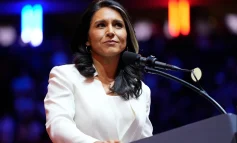WASHINGTON (IPS) — While a NATO-led coalition continues to
enforce a no-fly zone in a Libya that seems to be on the brink of catastrophe,
the Barack Obama administration has yet to formulate a set of guiding
principles in dealing with ongoing protests throughout the region in countries
like Bahrain.
In a nationally televised defense of his administration’s
Libya policy on Monday, President Obama stood by many of the promises made in
his 2009 Cairo speech — a pledge to support those in the Arab world who seek
more pluralistic, democratic forms of government.
“I believe that this movement of change cannot be
turned back, and that we must stand alongside those who believe in the same
core principles that have guided us through many storms: our opposition to
violence directed at one’s own people; our support for a set of universal
rights, including the freedom for people to express themselves and choose their
leaders; our support for governments that are ultimately responsive to the
aspirations of the people,” he said.
Despite this rhetoric, some analysts see Obama’s approach to
the uprisings in the region not as conforming to a broad strategic vision, but
as hinging on concessions to regional partners’ “red lines” for
reforms — as in Bahrain, where U.S. ally Saudi Arabia fears that a more
politically inclusive regime will tempt Iran to expand its sphere of influence.
In the case of Bahrain, the Obama administration has taken a
decidedly different approach than in Libya or even Egypt. Despite the Bahraini
government’s crackdown on civilians and popular calls for political reform,
including representative governance, the U.S. has acceded to the Khalifa
regime’s minimal concessions and taken an ambiguous position on the presence of
Saudi troops in the country, which critics say has only exacerbated sectarian
tensions.
Sectarian fault lines
From the outset, demonstrations in Sunni-governed,
majority-Shia Bahrain were avowedly non-sectarian in character, but the
narrative shifted away from the domestic political sphere and became one of
sectarian conflict when Saudi troops, the majority of whom are Sunni, crossed
the causeway on Mar. 14 with a mandate from the Gulf Cooperation Council (GCC)
— ostensibly to protect the regime’s infrastructure, but in what came across as
a reinforcement of the al-Khalifa monarchic rule.
As a result of the Saudi response to escalating tensions in
Bahrain, and Washington’s indecisiveness on the matter, Bahrainis’ popular
perceptions of U.S. policy regarding the uprisings in their country may be
souring.
“Bahrain never had a sectarian problem, Sunni and Shia
having been living beside each other for years,” Husain Abdulla, director
of Americans for Democracy and Human Rights in Bahrain, told IPS.
“I’m very concerned that feelings of anti-Americanism
might rise in Bahrain,” he added. “[The Bahraini people had] looked
on the U.S. as someone who always applied minor pressure on the
government.”
Now, as Bahraini citizens watch images of U.S. and NATO
aircraft patrolling the skies from Benghazi to Tripoli with a mandate to
protect the Libyan people, they see potentially hostile GCC troops in their
streets, seemingly with Western blessing, Abdulla said.
Adding to this aggravation of sectarian fault lines is the
supposedly looming threat of an increasingly influential Shia-led Iran.
The Persian boogeyman
“The government has used the sectarian card several
times when they have been pressured to reform,” Abdulla said. “The
al-Khalifa has used Iran as the boogeyman for the West.”
“It is not clear that the Bahraini authorities are
interested in national dialogue at this point,” American University
Professor Kristin Diwan added. “They are stressing that security and
stability come first. They are deepening the campaign of arrests. They are
clearly building a case that the arrested activists are associated with Iran
and thus delegitimizing their standing as interlocutors.”
Days before the GCC intervention, U.S. Secretary of Defense
Robert Gates, after meeting with Crown Prince Hamad al- Khalifa, mentioned the
possibility of Iranian meddling if the regime didn’t enact sweeping reforms.
“[T]here is clear evidence that as the process is protracted, particularly
in Bahrain, the Iranians are looking for ways to exploit it and create
problems,” he said.
“The best way to limit Iranian influence in the Gulf is
to fully integrate Shia citizens within their respective countries,” Diwan
argued. “This is becoming impossible as Gulf monarchies unleash sectarian
rhetoric to confront their domestic challenges.”
“Iran certainly had influence amongst some Bahraini Shia
movements in the years following the Islamic Revolution, and inspired
many,” Diwan noted. “But the focus since then has moved strongly
toward the national, not transnational, political arena. I do worry that there
may be a move back toward transnational influence if the political reform
process is frozen and the Shia are not brought back into a strengthened
parliament.”
Putting principles into practice
Distilling U.S. policy into purely strategic or military
terms – such as satisfying the demands of longtime allies or the protection of
U.S. interests in the Persian Gulf and its ability to project force in the
region – does not bode well for popular perception among Bahraini citizens, who
wish to see the U.S. as a reliable partner in pushing for real reform.
While the flood of pro-democracy activism in the region has
tested Obama’s ability to translate good-intentioned principles into practice,
the vexing nature of values versus interests continue to dominate discussions
over policy, such as with the recent intervention in Libya, where the
administration insists that Muammar Gaddafi must step down.
“The U.S. would like to have a stable Bahrain in which
the Shia are given certain rights…but at the same time I don’t think the U.S.
would like to see the toppling of this regime,” Professor of Near Eastern
Studies at Princeton University Bernard Haykel told IPS.
For some regional observers, the historical clichés of U.S.
double standards in the Middle East thus ring true today.
In his speech, President Obama argued that, given
developments in the Middle East in the past few months, the better strategy
moving forward would be a flexible one.
But as the window of opportunity for a national dialogue
closes in Bahrain, it may already be too late to rectify the perceived absence
of U.S. support for democratic reform in the country, and make all but
impossible what the U.S. barely averted in Egypt – falling on the wrong side of
the reform.





Leave a Reply